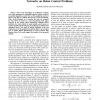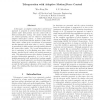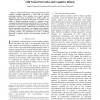329 search results - page 8 / 66 » A Neural Network-Based Approach to Robot Motion Control |
CEC
2008
IEEE
13 years 10 months ago
2008
IEEE
One of the advantages of evolutionary robotics over other approaches in embodied cognitive science would be its parallel population search. Due to the population search, it takes a...
ICRA
1999
IEEE
14 years 26 days ago
1999
IEEE
In this paper, an adaptive motion force control based approach is proposed to control bilateral teleoperation systems under both position and rate control with arbitrary motion fo...
ICRA
2000
IEEE
14 years 29 days ago
2000
IEEE
We propose a concept for integrating multiple sensors in real-time robot control. To increase the controller robustness under diverse uncertainties, the robot systematically gener...
NN
2008
Springer
13 years 7 months ago
2008
Springer
- This paper describes mechanisms used by humans to stand on moving platforms, such as a bus or ship, and to combine body orientation and motion information from multiple sensors i...
IJCNN
2006
IEEE
14 years 2 months ago
2006
IEEE
— Neural networks have been proposed as an ideal cognitive modeling methodology to deal with the symbol grounding problem. More recently, such neural network approaches have been...



